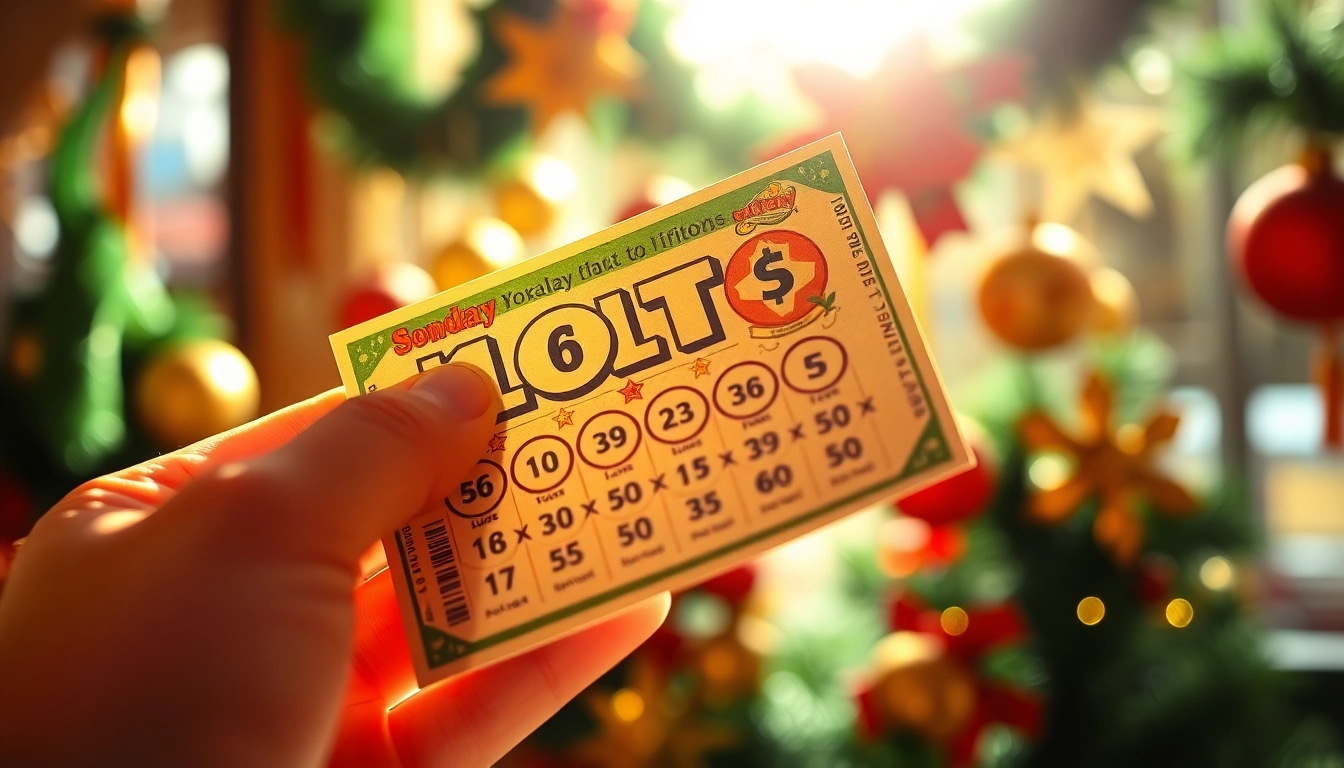Understanding the Lotto System
What is Lotto? Exploring the Basics
Lotto is a popular game of chance that has captivated players around the globe with its promise of life-changing payouts and the thrill of anticipation. At its core, lotto is a lottery game in which players select a set of numbers, typically drawn at random during a live event. The primary objective is to match these numbers with those drawn to win prizes, which can range from modest amounts to staggering jackpots. In the U.S., different states offer their own versions of lotto, each with its specific rules and prize structures. For many, participating in the lotto is more than just a gamble; it’s an experience filled with hope and excitement. If you’re looking to learn more about the intricacies of lottery games, consider exploring lotto games that provide insights and strategies for engaging in this high-stakes game.
The Different Types of Lotto Games
While the concept of lotto is straightforward, the variety of games available can be overwhelming. Here are some of the most popular types:
- Traditional Lotto: Players choose a set of numbers, usually between 1 and 49 or 1 and 59, and hope to match them with the numbers drawn during a live event. This is often referred to as “6/49” or “5/59” format.
- Powerball: One of the most well-known lotto games in the U.S., Powerball requires players to select five numbers from a set of white balls and one number from a red Powerball. The jackpots are generally larger than traditional lotto games.
- Mega Millions: Similar to Powerball, Mega Millions also involves selecting a set of five numbers along with a Mega Ball. This game often generates massive jackpots that attract players nationwide.
- Daily Draw Games: Many states offer daily draw games that allow players to participate more frequently. These games might have different structures and odds, but the principle remains the same—match your chosen numbers to those drawn.
How Lotto Draws Work
Lotto draws can vary significantly by game and jurisdiction. Typically, the process involves the following steps:
- Ticket Purchase: Players purchase tickets, which can typically be done in-store or online. Each ticket corresponds to a unique set of chosen numbers.
- Drawing: Drawings are held at scheduled times, either weekly or daily, depending on the game. Most states broadcast the draws live, ensuring transparency and excitement.
- Result Announcement: After the drawing, the winning numbers are announced. Players must check their tickets to see if they have matched any numbers.
- Prize Claims: Winners must claim their prizes, which can vary in the way they are distributed (lump sum vs. annuity) based on the game and the amount won.
Choosing Your Lotto Numbers Wisely
Popular Strategies for Selecting Lotto Numbers
Choosing the right numbers in the lotto can feel daunting, but many players adopt strategies to help them make their selections:
- Quick Picks: Many players opt for quick picks, where the lottery terminal generates random numbers. This method is straightforward and minimizes the stress of selection.
- Significant Dates: Some players choose numbers based on significant dates such as birthdays, anniversaries, or personal milestones. This method can add sentimental value but may restrict number choices to 31 or fewer.
- Pattern Selection: A few players rely on patterns on the playslip, such as filling in a diagonal or creating shapes. While there’s no statistical advantage, it provides a fun twist to the selection process.
Statistical Approaches to Number Selection
More analytical players opt for strategies based on statistical analysis. Here are a few popular methods:
- Hot and Cold Numbers: Tracking hot numbers (those that have been drawn frequently) and cold numbers (those that have not been drawn for a while) can influence choices. However, past results do not affect future outcomes in a random draw.
- Number Frequency Analysis: Some players analyze historical draw data to identify trends over time. This could involve examining which numbers are most often drawn and using this information to guide selection.
- Combination Strategies: Using mathematical combinations can help players choose numbers that cover a wider range of possibilities. This method often leads to a broader ticket range.
Myths vs. Facts about Winning Numbers
Numerous myths exist around lotto number selection, and it’s essential to understand the facts:
- Myth: Certain numbers are “luckier” than others. Fact: Each number has an equal chance in a random draw, regardless of historical performance.
- Myth: You can predict the outcome based on past draws. Fact: Lotto drawings are random events; previous results do not influence future outcomes.
- Myth: Using the same numbers increases your chances. Fact: Every draw is independent; using the same numbers each time does not improve odds.
The Role of Lotto Odds and Probability
Understanding Lotto Odds: What You Need to Know
The odds of winning the lotto can vary drastically depending on the specific game being played. It’s essential to understand how odds work to make informed decisions:
In general, larger jackpots correlate with longer odds. For example, in games like Powerball, the odds of hitting the jackpot can be as low as 1 in 292.2 million, while the odds for smaller prizes might be significantly better, such as 1 in 24 to win any prize.
The Impact of Odds on Your Game Strategy
Your understanding of odds should inform your strategy when playing. Here are some tips:
- Focus on Smaller Games: If you want better odds, consider playing smaller local lotto games instead of huge national draws with astronomical odds.
- Participate in a Syndicate: Forming a lotto syndicate allows players to pool resources, buy more tickets, and increase the chances of winning, albeit with shared prizes.
- Set Realistic Expectations: Understand that while winning a major jackpot is thrilling, it is unlikely, so it helps to manage expectations and play for fun.
How to Calculate Your Chances of Winning
Calculating your chances of winning involves understanding the total number of possible combinations in a particular lotto game. This can typically be expressed in a format like:
For a 6/49 lottery, the number of combinations is given by “49 choose 6,” which can be calculated using the formula:
\\( C(n, r) = \\frac{n!}{r!(n – r)!} \\)
For instance, that would be: \\( C(49, 6) = \\frac{49!}{6!(49 – 6)!} = 13,983,816 \\)
This means the odds of winning the jackpot are 1 in 13,983,816, illustrating why the jackpot can be so high!
Best Practices for Playing the Lotto
Setting a Budget: How Much Should You Spend?
Before diving into the lottery world, it’s crucial to set a budget to limit your spending. Here are some guidelines:
- Determine Your Spending Limit: Assess your finances and decide how much you can afford to spend without impacting your essentials.
- Allocate a Fixed Amount: Some players choose to allocate a fixed monthly or weekly amount for lotto tickets. This creates a sustainable approach to playing.
- Avoid Chasing Losses: It’s vital to resist the impulse to spend more if you’ve experienced some losses to try and regain what you’ve lost.
Tips for Managing Your Lotto Play
Managing your lotto play effectively can enhance enjoyment while minimizing potential pitfalls:
- Diversify Your Games: Instead of sticking to one game, consider trying different types of games to explore various odds and prize amounts.
- Join a Lotto Pool: Being part of a group or syndicate can make the financial burden less and potentially amplify chances of winning through collective ticket purchasing.
- Keep Your Tickets Safe: Always store your tickets in a secure place to avoid losing them or someone else claiming your prize.
The Importance of Responsible Gaming
Playing the lotto should always be fun, but it’s essential to practice responsible gaming:
- Recognize When to Stop: If you find yourself playing excessively, take a break and seek help if needed.
- Understand Gambling Risks: Being informed about the risks associated with gambling can help maintain a healthy relationship with gaming.
- Seek Support if Necessary: There are many support resources available for individuals who may struggle with gambling addiction.
Maximizing Your Potential Winnings
Understanding Lotto Payout Structure
Understanding how winnings are paid out is crucial for players:
- Jackpot Payments: Winners may choose a lump sum payout or an annuity where the jackpot is paid out over a period (often 30 years).
- Secondary Prizes: Many lotto games offer secondary prizes based on matching fewer numbers, with payout structures varying significantly.
What to Do If You Win: Claiming Your Lotto Prize
Claiming your winnings promptly and correctly is vital. Here are the general steps:
- Check the Winning Numbers: Confirm your ticket matches the drawn numbers, and verify your winnings through official channels.
- Keep Your Ticket Safe: Sign the back of your ticket and keep it in a secure place until you can claim your prize.
- Claiming the Prize: Depending on the amount won, you may need to visit a lottery office or can claim smaller winnings at a local retailer.
- Consult a Financial Advisor: Especially for large jackpots, consider consulting with financial professionals for optimal tax management and investment planning.
Investing Your Lotto Winnings Wisely
Once you claim your prizes, consider investing wisely:
- Pay Off Debts: Using some winnings to pay off debts can provide financial stability.
- Diversify Investments: Consider investing in a mix of stocks, bonds, and real estate to create a balanced portfolio.
- Set Up an Emergency Fund: Having a safety net in place can provide peace of mind for unexpected expenses.

